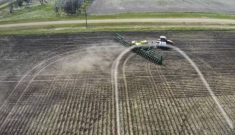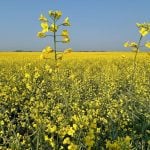SEVERAL TIMES EACH WINTER,Don Campbell and his wife Bev leave the ranch they operate with their two sons and daughters-in-law in northwestern Saskatchewan. Their goal is to empower other producers like themselves to make positive choices.
Their message to the farm families who attend their six-day workshops is that to be successful, you need to take care of your people, your land and your finances.
It’s an approach called holistic management, and it’s a belief that the Campbell family lives as well as teaches.
Read Also

How scientists are using DNA and climate data to breed crops of the future
A method for forecasting how crops will perform in different environments so that plant breeders can quickly select the best parents for new, climate-resilient varieties.
The Campbells run 600 to 700 head of commercial cows on their 4,200-acre ranch. The cows are mostly Angus-Galloway crosses, bred to calve on pasture in May and June. The calves are then overwintered and pastured as yearlings the following summer. They are sold in the fall at 800 pounds to 900 pounds.
There are no pens on the Campbell farm. Bale grazing enables the entire herd to spend the winter months on the land, returning nutrients directly to where they are needed for subsequent crops of grass.
Holistic management is a decision-making process developed by Allan Savory, a Zimbabwean farmer and environmentalist, and Don and Bev Campbell began implementing it on their ranch in the mid-1980s.
Campbell describes it as a three-legged stool. “There are two definitions I like to use,” he says. “The first is that holistic management shows us how to take care of our people, improve our land and make a profit. The second is that it teaches us to make decisions that are simultaneously sound from a social, environmental and financial perspective.”
The first step in developing a holistic management plan for a family business like a farm is to develop a holistic goal, Campbell says. It has to be a goal that has everyone’s buy-in. It should tie in quality-of-life considerations with what can be produced at a profit, as well as landscape issues like what the farm and the surrounding community will look like in 50 years.
This holistic goal isn’t so much something that the business tries to achieve as it is a long-term vision that sets direction and guides the farm’s decisions. Campbell compares it to the north star. If a new initiative, enterprise or management practice brings the farm closer to the holistic goal, then it is worthy of further consideration. If not, it should be shelved.
Then there is a series of “testing questions” that Campbell encourages managers to ask themselves about any new ideas they are seriously looking at implementing. These include detailed budgeting that assesses its potential profit and an examination of its societal and landscape implications.
“What’s unique about this process,” says Campbell, “is that it brings balance to people’s lives. For example, the relationship skills we’ve developed through holistic management are what enable us today to be ranching with our two sons and their wives. At the same time, it has doubled the productivity of our ranch in terms of the grass that it produces. That’s like getting another 4,200 acres free.”
Gren Winslow, editor of Canadian Cattlemen magazine, has known Don Campbell for over 20 years. He says that other producers listen to Campbell because he practises what he preaches.
“Like a lot of other people in the cattle business,” Winslow says, “Don is kind, honest and low key. But what sets him apart is that he’s been willing to step up to the plate and share some of the strategies that have worked on his operation.”
Winslow says that Don’s commitment to intensive grazing and to reducing costs in innovative ways has enabled him to develop a model that works for his family, something that has not been easy to achieve in the cattle industry in the wake of the BSE crisis.
Campbell agrees both he and his wife have credibility with producers because they are just “ordinary people.”
In fact, it’s another goal, he says. “We are ranchers empowering other ranchers to have a better life.”
Holistic management workshops are available to communities throughout Western Canada. Besides the Campbells, there are several other educators who make themselves available in the winter months to share their experiences and knowledge with other farmers. The group has a website, www.holisticmanagement.ca, where more information is available.
As well, says Campbell, workshop participants often go on to join management clubs to meet and share ideas as they implement change on their individual farms. They can also subscribe to a newsletter that the holistic management group publishes on a monthly basis.
“Change is never easy,” Campbell says. “It’s important to have a support network when you’re trying to make these kinds of positive transformations in your life.”
———
“ Holistic management shows us how to take care of our people, improve our land and make a profit.”
— Don Campbell














